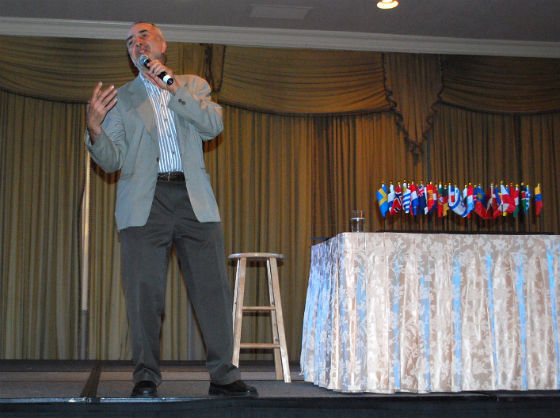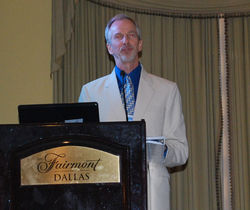By Leslie Minora
SOURCE: blogs.dallasobserver.com, June 3, 2011
Well, that was certainly...unexpected. Last night I went to the SMU-hosted Global Summit on Ending Corporal Punishment and Promoting Positive Discipline and wound up being treated to a presentation by none other than kiddie performer Raffi, who, as it turns out, is a children's-rights advocate when he's not entertaining the wee ones with his poppy positivity.
Photos by Leslie MinoraRaffi Cavoukian, children's singer and advocate, performed for the crowd at the SMU Global Summit on Ending Corporal Punishment last night.
Raffi Cavoukian (that's his full name) founded the Centre for Child Honouring and was in Dallas for first-of-its-kind summit, which runs through Sunday at the Fairmont Hotel. The Hilltop has gathered academics, policy makers, educators and advocates from 21 different countries to explore the issue of corporal punishment -- and why it ought to be stopped.
Following an introduction by George Holden, the SMU psychology professor who organized the event and wrote this piece about why Texas schools should ban corporal punishment. After a brief hello to the crowd of about 100 people at the summit's kick-off, Cavoukian broke into song. "This little light of mine," he began, "I'm gonna let it shine." Before long, many in the crowd were singing and swaying along.
George Holden, the event's organizer"There's nothing little about the light of being human, is there?" he asked. "I think we need to inspire the world to do well by the child." Cavoukian, as energetic and excited a public speaker as he is a performer, sang and danced up and down the center aisle between rows of chairs. Buttoned-up academics and educators went along for the ride. But, of course, the light presentation came with a serious message.
Mali Nilsson, the chair of Save the Children in Sweden and a global leader on ending corporal punishment, reminded the audience, "More than 90 [countries] still authorize the beating of children in schools...29 [countries] have achieved full prohibition." Nilsson calls corporal punishment "the most common and widespread violence against children." Corporal punishment, she said, "disguises violence as discipline."
Fifth-grader, Dawn Ford, spoke and performed at the summit.The evening of speeches about abuse against children wouldn't have been complete without hearing the perspective of a child. Dawn Ford, a Dallas fifth-grader who won second place at this year's Gardere MLK Jr. Oratory competition, gave her insight in a speech that left the crowd staring – and smiling – at each other in awe.
"Quite frankly, I believe that corporal punishment should be abolished. Period. End of story," she said. Though her parents never spanked or beat her, Ford said, "I have always known how important it is to follow the rules...We don't mind consequences, we just don't want to be hit."
"I could talk on this subject all night, but they only gave me a few minutes," she concluded, cuing music for her sweet performance of "What About the Children" with two interpretive dancers.
Raffi had some competition.



